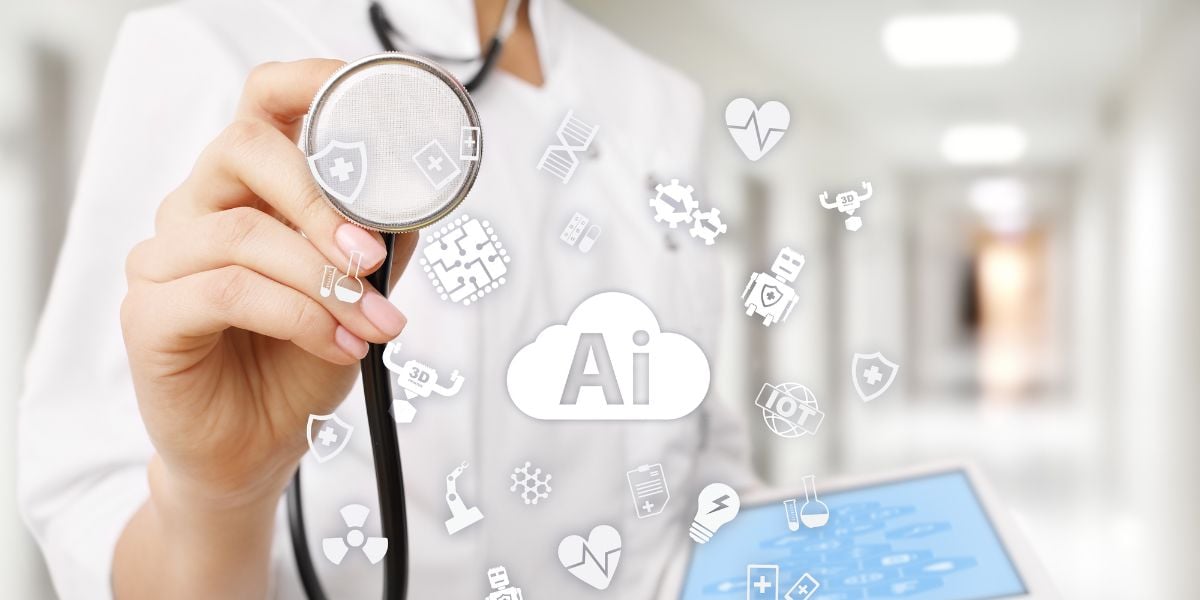We've been talking about artificial intelligence (AI) for decades, and what started as science fiction has become a reality — although not in a scary way. In the last five years, AI has gone from being a fun plaything to process language and numbers to a powerful tool in nearly every industry, including healthcare.
With the rise of interest in telehealth, AI has also exploded in healthcare at the same time. Physical doctor's offices and virtual ones can use AI to improve their standard of care and patient outcomes in various ways. We will look at how artificial intelligence is being used in healthcare, both in-person and online, and how it benefits physicians, patients, and everyone involved in the medical field.
How Does AI Work in the Medical Field?
AI is far more complicated than we can put in a single article, but briefly, the main benefit of AI in the healthcare field is machine learning. AI uses algorithms to quickly process large amounts of information and identifies significant trends and patterns. Machine learning can identify diagnoses that a physician might miss or help with patient intake and can be just as helpful in administrative tasks.
Machine learning is also replacing the old methods of electronically storing patient data and medical records. Pulling information based on the old rule-based expert system works fine with smaller amounts of data and patient numbers, but retaining records for decades and thousands of patients breaks this model down. As long as there is operational space for a machine learning AI to function, there's no limit to the amount of information AI can process and handle. This makes it ideal for record handling going forward.
AI for Patient Intake
AI can help make patient intake faster and more efficient by asking a standardized set of questions to help reduce wait times and aid in diagnosis. When a patient presents with a list of symptoms, a machine learning intake process can compare these to their health records and help identify acute diagnoses and ones based on long-term conditions. While machine-based learning won't replace a doctor's intuition and knowledge, it can make diagnosis, treatment, and visits more efficient. Keep in mind, the future will have a “Medical GPT”, for example: BioGPT. One of the barriers to this type of AI is making sure ChatGPT does not violate HIPPA. But rest assured that there are developers out there working on creating HIPPA compliant software!
AI for Administrative Tasks
One of the more challenging aspects of running a virtual practice is handling the administrative tasks that a fully staffed office would traditionally be charged with doing. Even in a physical office, AI can help make tasks like patient billing, appointment scheduling, and record keeping significantly more manageable and efficient.
HIPAA compliance is a huge concern with medical records — particularly in a virtual space — but AI can help make staying HIPAA compliant dramatically easier. Storage solutions, layers of data privacy protection, and IT security will help keep medical data in your office safe and secure.
Concerns About AI in Medicine
One of the biggest obstacles to the widespread adoption of telehealth is that a virtual visit cannot provide the same level of care or concern that an in-person appointment can offer. Particularly in older patients, this was a significant concern. The idea that part of the diagnostic process will be handled (or at least aided by) artificial intelligence can be a difficult stumbling block for a part of the patient population.
Whenever you take away the human element from a service, be it phone support, patient intake, scheduling appointments, or direct patient care, you will get backlash. Something about being able to ask a question to a person directly and get a response is powerfully soothing to people, and even though AI might be able to provide a clear and correct answer, this will also be an obstacle for a while.
While the future of AI in healthcare is vibrant, it will take some time to get the majority of patients on board.
The Future of AI in Healthcare
Regardless of the fear surrounding AI in healthcare, telehealth is becoming even more common than during the height of the COVID pandemic. Patients realize that remotely accessing healthcare can be highly beneficial, and, in most cases, it's just as effective as an in-person visit — just without the discomfort of a commute.
As with telehealth, AI will become more widely accepted and used as it becomes more powerful and practical.
ViTel provides a robust telehealth platform that can bolster every aspect of your practice. From administrative tasks and record keeping to patient intake, diagnosis, and physician credentialing, ViTel's system is built to help telehealth thrive.
If you want to see what a powerful, dedicated telehealth platform can do for you, contact us today for a free demo. ViTel is at the forefront of the virtual medical field, and we're here to help you use telehealth to its fullest extent.




